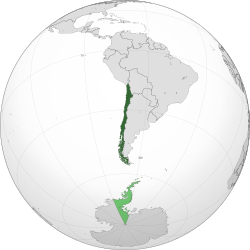Republic of Chile República de Chile | |||||||||
|---|---|---|---|---|---|---|---|---|---|
| 1973–1990 | |||||||||
| Motto: Por la razón o la fuerza ("By reason or by force") | |||||||||
| Anthem: Himno Nacional de Chile ("National Anthem of Chile") | |||||||||
 Chilean territory in dark green; claimed but uncontrolled territory in light green | |||||||||
| Capital | Santiago | ||||||||
| Common languages | Spanish | ||||||||
| Government | Unitary presidential republic under an authoritarian military dictatorship | ||||||||
| President | |||||||||
• 1974–1990 | Augusto Pinochet | ||||||||
| President of the Junta | |||||||||
• 1973–1981 | Augusto Pinochet | ||||||||
• 1981–1990 | José Toribio Merino | ||||||||
| Legislature | Government Junta | ||||||||
| Historical era | Cold War | ||||||||
| 11 September 1973 | |||||||||
| 11 March 1981 | |||||||||
| 5 October 1988 | |||||||||
| 11 March 1990 | |||||||||
| Area | |||||||||
• Total | 756,096.3 km2 (291,930.4 sq mi) (37th) | ||||||||
| Population | |||||||||
• 1973 | 10,095,485 | ||||||||
• 1980 | 11,178,817 | ||||||||
• 1990 | 13,187,821 | ||||||||
| HDI (1980) | 0.640 medium | ||||||||
| Currency | Chilean escudo (1973–75) Chilean peso (1975–90) | ||||||||
| ISO 3166 code | CL | ||||||||
| |||||||||
| History of Chile |
|---|
 |
| Timeline • Years in Chile |
An authoritarian military dictatorship ruled Chile for seventeen years, between 11 September 1973 and 11 March 1990. The dictatorship was established after the democratically elected socialist government of Salvador Allende was overthrown in a coup d'état backed by the United States on 11 September 1973. During this time, the country was ruled by a military junta headed by General Augusto Pinochet. The military used the breakdown of democracy and the economic crisis that took place during Allende's presidency to justify its seizure of power. The dictatorship presented its mission as a "national reconstruction". The coup was the result of multiple forces, including pressure from conservative groups, certain political parties, union strikes and other domestic unrest, as well as international factors.[A]
The regime was characterized by the systematic suppression of political parties and the persecution of dissidents to an extent unprecedented in the history of Chile. Overall, the regime left over 3,000 dead or missing, tortured tens of thousands of prisoners,[2] and drove an estimated 200,000 Chileans into exile.[3] The dictatorship's effects on Chilean political and economic life continue to be felt. Two years after its ascension, neoliberal economic reforms were implemented in sharp contrast to Allende's leftist policies. The government was advised by the Chicago Boys, a team of free-market economists educated in the United States. Later, in 1980, the regime replaced the 1925 Constitution with a new constitution in a controversial referendum. This established a series of provisions that would eventually lead to the 1988 Chilean national plebiscite on October 5 of that year.
In that plebiscite, 55% of voters rejected the proposal of extending Pinochet's presidency for another eight years. Consequently, democratic presidential and parliamentary elections were held the following year. The military dictatorship ended in 1990 with the election of Christian Democrat candidate Patricio Aylwin. However, the military remained out of civilian control for several years after the junta itself had lost power.[4][5]
- ^ Jack Devine & Peter Kornbluh, 'Showdown in Santiago: What Really Happened in Chile?', Foreign Affairs 93 (2014), 168-174.
- ^ "Country profile: Chile". BBC News. 16 December 2009. Archived from the original on 14 January 2010. Retrieved 31 December 2009.
- ^ Wright, T.C.; Oñate, R. (2005), "Chilean Diaspora", in Ember, M.; Ember, C.R.; Skoggard, I. (eds.), Encyclopedia of Diasporas: Immigrant and Refugee Cultures Around the World, vol. II, pp. 57–65
- ^ Angell, Alan; Pollack, Benny (1990). "The Chilean Elections of 1989". Bulletin of Latin American Research. 9 (1). Society for Latin American Studies: 1–23. doi:10.2307/3338214. JSTOR 3338214.
- ^ Agüero, Felipe (2003). "30 años después: La ciencia política y las relaciones Fuerzas Armadas, Estado y sociedad". Revista de Ciencia Política (in Spanish). XXIII (2): 251–272.
La fuerte posición de los militares en ellas, junto a la continuación de turbulencias [...] emanadas de actos de rebeldía y abierto desafío a las nuevas autoridades por parte de jefes castrenses, pusieron también en el tapete los temas del control civil o poder democrático sobre dicha institución y sus dificultades [...]. Desde esta situación se puso también a Chile en un debate comparado sobre los problemas en la implantación de la supremacía o control civil, sus contextos institucionales y sus mecanismos más efectivos...
Cite error: There are <ref group=upper-alpha> tags or {{efn-ua}} templates on this page, but the references will not show without a {{reflist|group=upper-alpha}} template or {{notelist-ua}} template (see the help page).

